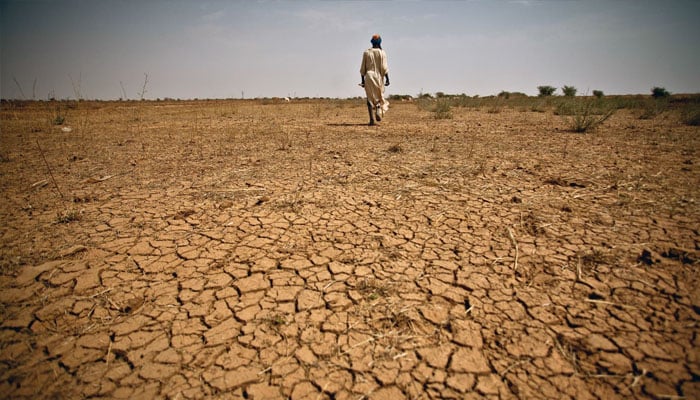UN lists Pakistan among drought-hit countries
Pakistan have experienced drought emergencies in the last two years, UNCCD report
NEW YORK: The United Nations has listed Pakistan among 23 countries on Sunday which are facing drought emergencies. According to the report released by the United Nations Convention to Combat Desertification (UNCCD) stated that 23 countries including Pakistan have experienced drought emergencies in the last two years.
The 23 countries listed by the report include Afghanistan, Angola, Brazil, Burkina Faso, Chile, Ethiopia, Iran, Iraq, Kazakhstan, Kenya, Lesotho, Mali, Mauritania, Madagascar, Malawi, Mozambique, Niger, Somalia, South Sudan, Syria, Pakistan, the United States and Zambia.
The report also stated that an additional 4 million square kilometres will need to be rehabilitated by 2050 while emphasising the need to provide immediate funding to developing countries. United Nations Global Land Outlook says about Pakistan that desertification Control through Sustainable Land Management Productive land is scarce in Pakistan – 80 percent of the country is arid or semi-arid. Land degradation and desertification are caused by unsustainable land management practices, coupled with increased demand for natural resources, and driven by a rapidly growing and largely rural population dependent on dry lands for their livelihoods.
To address these problems, in 2007, the Pakistani government began implementing a Sustainable Land Management program across nine dry land districts. Over eight years, 120 square kilometers of degraded rangeland were rehabilitated through reseeding and community-based grazing management, and a further 80 square kilometers under sustainable rainfed agriculture and water conservation measures.
In 2015, the project was extended and rolled out more widely, utilising water control and storage structures, creating shelterbelts and rangeland management plans, restoring degraded dry land forest (e.g., community tree nurseries and plantations for domestic fuel), and implementing sand dune stabilisation measures. As a result, some 13,000 households directly or indirectly benefited from nearly 200 square kilometers of improved land health, better access to water for livestock, and reduced wind erosion.
This success of the program inspired the Billion Trees Afforestation Project in Pakistan’s mountainous Khyber Pakhtunkhwa, which saw 3,500 square kilometers of forests and degraded land restored in just two years.
In 2018, the popularity of this initiative gave impetus to the world’s largest reforestation initiative — the Ten Billion Tree Tsunami Programme – as part of a suite of nature-based solutions to fight desertification and climate change in Pakistan.
In the province of Balochistan, Pakistan, indigenous management techniques, known as the karez system, utilize tunnels that follow a natural gradient to deliver groundwater without employing mechanical energy.
-
 Emma Roberts Stars In 'A Body In The Woods'
Emma Roberts Stars In 'A Body In The Woods' -
 'Our Estrangements Can Kill Us': Meghan's Co-star Weighs In On Anthony Hopkins Interview
'Our Estrangements Can Kill Us': Meghan's Co-star Weighs In On Anthony Hopkins Interview -
 ‘Tone Deaf’ Andrew Called Out Over Arrogant Behaviour Amid Epstein Scandal
‘Tone Deaf’ Andrew Called Out Over Arrogant Behaviour Amid Epstein Scandal -
 Singing, Dancing & Outperforming: Watch China’s Robot Fair Ahead Of Spring Festival 2026
Singing, Dancing & Outperforming: Watch China’s Robot Fair Ahead Of Spring Festival 2026 -
 WhatsApp Under Fire: EU Steps Up Pressure On Meta Over Claims Of Blocking AI Rivals
WhatsApp Under Fire: EU Steps Up Pressure On Meta Over Claims Of Blocking AI Rivals -
 Steven Van Zandt Criticizes Bad Bunny's 2026 Super Bowl Performance
Steven Van Zandt Criticizes Bad Bunny's 2026 Super Bowl Performance -
 Katie Price Seen With New Hubby Lee Andrews Weeks After Tying The Knot
Katie Price Seen With New Hubby Lee Andrews Weeks After Tying The Knot -
 Biggest Order Yet Issued Against Andrew Mountbatten-Windsor: King Charles You Have To’
Biggest Order Yet Issued Against Andrew Mountbatten-Windsor: King Charles You Have To’ -
 ByteDance’s Seedance 2.0 Marks New Era Of Cinematic AI-generated Videos: Here’s How
ByteDance’s Seedance 2.0 Marks New Era Of Cinematic AI-generated Videos: Here’s How -
 Struggling With Obesity? Here's How To Manage It
Struggling With Obesity? Here's How To Manage It -
 How Epstein Scandals Are Impacting King Charles’ Healing As Stress Refuses To Relent: ‘Could Spell His End’
How Epstein Scandals Are Impacting King Charles’ Healing As Stress Refuses To Relent: ‘Could Spell His End’ -
 Why Prince William Releases Statement On Epstein Scandal Amid Most 'challenging' Diplomatic Trip?
Why Prince William Releases Statement On Epstein Scandal Amid Most 'challenging' Diplomatic Trip? -
 Ciara, Russell Wilson Become Matchmakers For Pals?
Ciara, Russell Wilson Become Matchmakers For Pals? -
 Historic Mental Health Facility Closes Its Doors
Historic Mental Health Facility Closes Its Doors -
 Top 5 Easy Hair Fall Remedies For The Winter
Top 5 Easy Hair Fall Remedies For The Winter -
 Japan Elections: Stock Surges Record High As PM Sanae Takaichi Secures Historic Victory
Japan Elections: Stock Surges Record High As PM Sanae Takaichi Secures Historic Victory




